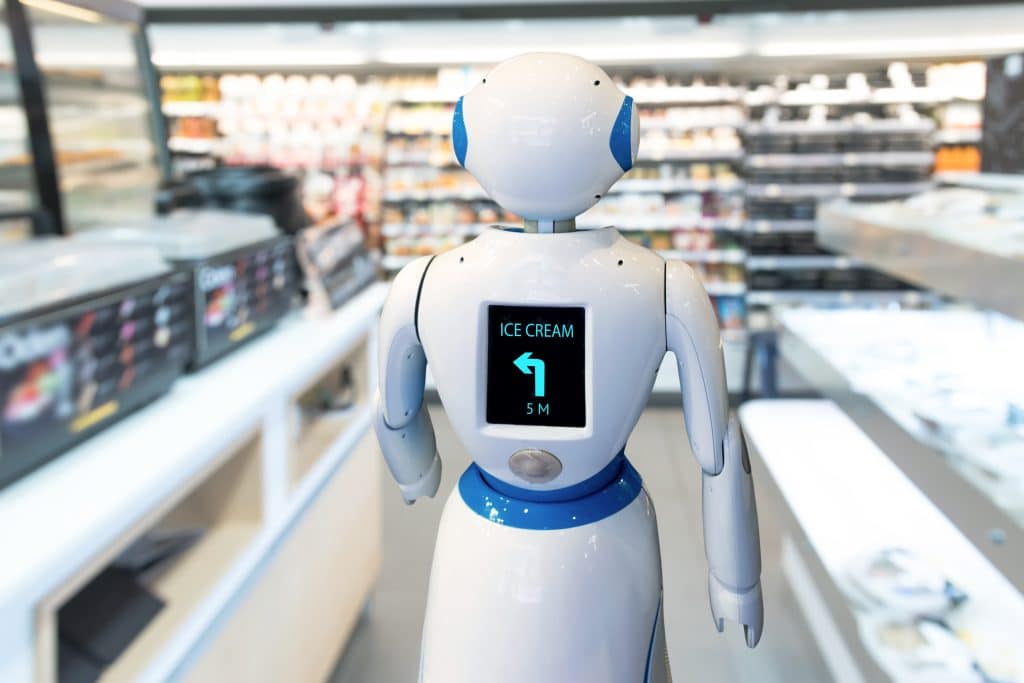While not yet a common sight, incremental changes towards robots replacing humans in stores are already being trialed by the likes of Nestle in Japan, Best Buy and Lowe’s in the US and even Amazon Go’s “check-out-less” supermarkets thought to be coming to the UK soon.
The British Retail Consortium (BRC) estimates that over the next 20 years, 60 per cent of jobs in retail will be at risk due to automation, so as much as we may want to play it down in the industry, it’s virtually impossible to overestimate how artificial intelligence (AI) will change the sector.
“Admittedly, we’re some way off an era of android shop assistants, but where AI will start to have a serious impact for retail is in the supply chain. Inventory management systems are already in play”, said Brabners’ employment partner Andrew Cross.
Cross pointed to the fact that Walmart already uses AI to solve ‘last mile’ delivery issues, while German ecommerce brand Otto Group uses a cloud-based machine-learning system that has reduced its out-of-stock rates by 80 per cent.
“While some types of AI will make the lives of employees easier, the direction of travel for the technology is, in many cases, to replace humans altogether. This transition will present challenges for a heavily scrutinised sector with many high-profile consumer-facing brands.
“We’re not that far away from AI being capable of more complex administrative tasks and stock management roles in warehouses, so retailers will need to consider how their workforces will be affected.”
In many other cases, Cross believes the jobs that exist now will start to disappear, so role changes and the possibility of redundancies needs to be addressed early and the interests of employees considered as much as possible.
Anyone asking if robots will really take your job is in fact, woefully behind the times – change is already afoot. Earlier this week, House of Fraser’s logistics operators XPO announced the deployment of 5,000 intelligent robots across its warehouses in Europe and the US.
“The collaborative robots help our workers more than double the speed at which orders are processed, allowing workers to fulfil up to 48 orders simultaneously”, XPO Logistics supply chain managing director Richard Cawston told Retail Gazette.
“Further, the robots will handle the heavy lifting and moving of inventory, making warehouse operations safer for workers.”
But Cawston also emphasised that “automation and robotics alone are not the answer”, and that implementation will be warehouse-specific depending on the needs of each location.
XPO describe the introduction of the robots as a way to “evolve operations”:
“Our new site in Leicestershire will be the UK logistics command centre for Nestlé’s brands and consumer-packaged goods, including Kitkat and Nescafe,” Cawston added.
“Through our partnership with Nestlé, we are building a custom-designed distribution centre that will feature integrated data analytics, intelligent machines, advanced sorting systems and robotics. This end-of-line automation will ultimately have one purpose: streamline operations for Nestlé which allows it to meet increasing consumer demand.”
Full steam ahead for automation back-of-house, then, but how do customers really feel about dealing with AI in the place of a human sales advisor?
Over time, self-service tills, magic AR mirrors and chatbots have filtered into everyday retail experiences for retailers right across the British high street. But how much of this is change customers want to see?
“For all the genius involved in these technologies, there is one part of the fully-automated retail experience that hasn’t yet been properly cracked: removing the people entirely from the purchasing process”, said Infosys Consulting associate partner Manu Tyagi.
“These advances are unarguably impressive, and spell a bright future for the retail industry. However, we’re finding that some consumers still prefer the reassurance of human interaction – and this need should not be ignored.
“For instance, in 2015 Morrisons reintroduced human-staffed checkouts for small shopping baskets – a move away from the wave of automated, self-service tills that have swept the nation. It turns out that people quite enjoy their everyday interactions with the smiling, familiar checkout operator; advice from a knowledgeable shop assistant; or just bumping into a friend in the local supermarket queue.
“So, while the way we shop might be becoming increasingly automated, retailers would be wise not to forget the power of people. With the future of retail nearly here, the real question is how to ensure it remains appealing and convenient for future consumers,” Tyagi added.
On one side, change is inevitable and there’s plenty of it taking places behind the scenes of the retail sector. On the other, retailers dealing with the fall out of job cuts and fewer customer-facing employees will have a hard time persuading consumers it’s worth it in the long run – Morrison’s re-introduction of checkout staff shows that in a nutshell.
“The rise of automation through AI will have a much more significant impact on retail than other industries” said Sutherland director of retail Christopher Schyma.
“This is the result of the changing retail industry – today’s customer requires digital-first experiences, where needs are met and expectations exceeded across a variety of touch points and at the complete convenience of the shopper.
“However, technology will not replace all retail jobs. Personalisation still requires human interaction augmented by innovation that supports intelligent automation and machine learning in the background.”
Crucially, Schyma points out that the onset of AI in store will enable employees to focus on the tasks only humans can do.
“Intelligent automation will increase efficiency and free employees from the need to perform the most mundane and repetitive tasks, allowing them to focus on creative challenges or interactions that require real, human empathy.
“The rise of AI comes with career opportunities, too. Following the digitalisation of our shopping experiences, retailers are desperate to fill new roles in areas such as data-science, data cleansing, analytics, content management, and content moderation. Demand is growing and not enough is being done to create a sustainable feed of talent in these areas.
“Rather than losing the current workforce, which possesses valuable knowledge and understanding of the brand, retailers should seek to up-skill them and transform old jobs into new roles.”
“The rise of automation shouldn’t be seen as a threat, but instead an opportunity to improve the business in challenging times, save staff from job losses, and provide them more relevant future-proof careers.”
Taking it a step further, Vee24 chairman and chief executive Priya Iyer believes retailers should be embracing everything that is human about their workforce.
“The more human your retail contact centre interactions are with the customer, the more likely you won’t be killed by the AI trend,” he said.
“While AI technology can provide efficiency and cost savings, human interaction creates value like no other. People are social beings, and ultimately nothing can ever truly replicate the experience of connecting with another person.
“Only humans can create a sense of relationships and trust with your customer. (For instance) video chat empowers your contact centre teams to build a trusted advisor relationship with your customer – something ChatBots simply cannot offer.
“Tuning your contact centre for high volume per operator and low average call duration will result in agents that behave like bots. That’s exactly what AI will kill. Make them more human right now and use all their human attributes to provide the best sales and service online. That’s a service that no AI can replicate.”
So much of what we attribute to good retailing, we intrinsically align with good human behaviour. Just think of all those aspects we consider to be great customer service – “the customer is always right” is pure empathy.
Receiving expert opinion or styling tips are also major reasons to still go into a clothes store, for instance, instead of buying online.
While plenty has already changed for retail, the humans at the heart of it aren’t going anywhere.
Click here to sign up to Retail Gazette‘s free daily email newsletter


















